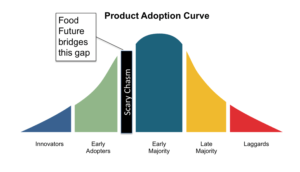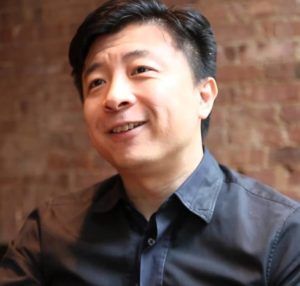FoodFutureCo is about to graduate its first cohort. The scale-up accelerator launched earlier this year and took on four companies into its first program:
- 4P Foods, a local food hub and supply chain business which, to date, has delivered over 40k bags of food from over 130 local farms to over 250 zip codes in the DC Metro area. They are expected to reach $1.1 million in top-line sales with nearly 50% gross margin for 2016 and nearing break-even in just under 3 years.
- eFowl, a transaction and marketing plaform for America’s traditional and family poultry farms, has facilitated over 65k transactions representing approximately 200 different breeds.
- Sophie’s Kitchen -has a line of seafood alternative products selling in nearly 2k retail outlets nationwide.
- Traverse, founded by Nextdoorganics’ founders Kris and Josh, is a SaaS provider, facilitating “intelligent food brokering” across the distribution chain from farmers and small batch producers to food hubs, farmers markets, and restaurants all the way through to the individual consumer.
The cohort will graduate on Wednesday this week and the accelerator expects to announce the next cohort after the holidays. To be in for a last minute chance of making it onto the first cohort of 2017, or onto the following cohort, you can apply here.
We caught up with Shen Tong, founder of FoodFutureCo and its earlier stage predecessor Food-X, to find out more about the program.
What lessons had you learned in launching Food–X when you came to launch FoodFutureCo?
What carries through from three years of experience at Food-X are two distinctive trends. The first is more of a movement — the good food movement, and then the other really hot trend is in food tech and food delivery. As a group, we have built a network that’s deeply rooted in both, but it’s hard to bring the two trends together as they’re still evolving.
What is a scale-up accelerator compared to a normal accelerator?
It’s an accelerator that’s taking companies at a later stage and for us, this means deliberately looking for companies that are post-revenue but at the stage where they could hit a second wall and their growth plateaus or fails altogether. How do you move from an early adopter to a successful, sustainable business? There’s a big chasm and about
 90% of companies at this stage do not progress further. An analogy I like to use is that Food-X and other typical accelerators are like working with toddlers, which are learning to talk and walk; Food Future is working with teenagers that are facing a different set of challenges. And our goal is to add two zeros to their revenue figures in an intensive four to six-month program.
90% of companies at this stage do not progress further. An analogy I like to use is that Food-X and other typical accelerators are like working with toddlers, which are learning to talk and walk; Food Future is working with teenagers that are facing a different set of challenges. And our goal is to add two zeros to their revenue figures in an intensive four to six-month program.
When you launched FoodFutureCo, did you find the companies or did they come to you?
We started with just four companies for the first cohort as a sort of soft launch. Two out of the four were already in our network — Nextdoorganics took part in Food–X’s first cohort and 4P Foods, who we saw speak at a conference. We had already built a network with Food-X before we launched FoodFutureCo, so over 90% of applications are inbound as we have built a good reputation, particularly as our managing director founded Plum Organics which was sold to Campbell Soup. We were pleasantly surprised by the number of applicants considering the companies need to be post-revenue as well as our other softer requirements such as a category leader, and broad impact growth potential.
What support do you give startups on a weekly basis and how are advisors incentivized?

Each week there is a highly curated seminar on specific areas and we keep an eye on changing trends in the food movement and investment space to make sure they’re up-to-date. The seminars are tailored to that specific cohort or even individual companies. The companies each get a handful of advisors and on-site entrepreneurs-in-residence to have biweekly sessions with. Lots of the advisors are volunteers that are part of the ecosystem so for them, it’s relationship-building creating a symbiotic relationship.
What equity stake do you take?
It ranges between 6% and 8%.
How do you see the food and ag startup space developing over the next 1,5,10 years?
Right now and especially over the last 2 years, we have seen at least half of big food set up ventures funds and corporate venturing arms, and we’re still very much in the honeymoon period of that. But it’s very interesting to see that the startups they’re investing in and embracing are fundamentally going to disrupt these incumbents.
Futurists have an easy job. If you look a bit longer term the situation is very clear. In the next 15 to 30 years, we know that many of the big ag and big food names will either disappear or become fundamentally different companies. We are lucky to be in the early stage innovative space where startups can easily try new things and learn quickly from failures, where big companies cannot. And this innovation is corresponding to a cultural shift and behavior change among millennials and a move away from consumerism. There’s this deep-seated desire to break things down and reconnect with nature, know where your food comes from, and what it means in the broader world. For some people, this will mean a post-meat life.
Amazing fact about Shen Tong: he was one of Newsweek’s People of the Year in 1989 as one of the organizers of the democracy movement in 1989 that occupied Tiananmen Square while he was at Beijing University.





